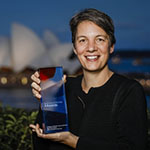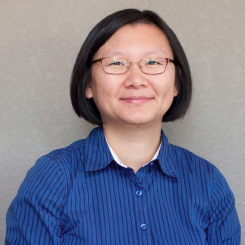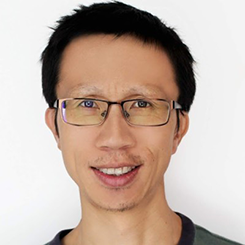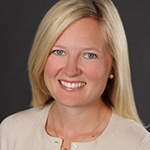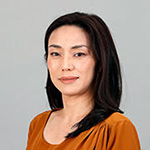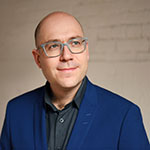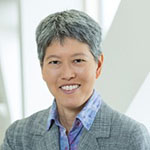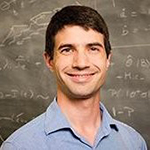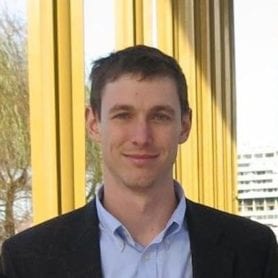Keynote Speakers
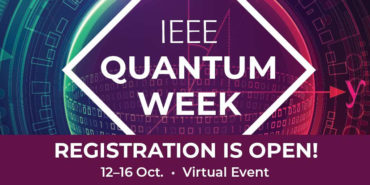 The Quantum Week 2020 program will feature outstanding proven keynote speakers addressing topics of the IEEE International Conference on Quantum Computing and Engineering. The plenary keynotes are intended to fire up the conference attendees at the beginning of each conference day and provide food for thought to stimulate discussion at the end day. The keynote speakers will promote the virtues and state of the art of the different themes of quantum computing and engineering.
The Quantum Week 2020 program will feature outstanding proven keynote speakers addressing topics of the IEEE International Conference on Quantum Computing and Engineering. The plenary keynotes are intended to fire up the conference attendees at the beginning of each conference day and provide food for thought to stimulate discussion at the end day. The keynote speakers will promote the virtues and state of the art of the different themes of quantum computing and engineering.
QCE20 Format and Schedule
QCE20 will be held in a digital-only or virtual-only format during the week of Oct 12-16, 2020. QCE20 was originally scheduled to be held in Broomfield, Colorado which is in the Mountain Time Zone (MDT) or UTC-6. The QCE20 daily program will be broadcast from 8:30 to 19:45 Mountain Time. Recorded sessions will be available for registered QCE20 attendees a few hours after the live sessions until November 30, 2020. Every day of this week, QCE20 hosts 9-10 parallel tracks of quantum computing and engineering programming including Workshops, Tutorials, Technical Paper Tracks intermixed with Keynotes, Panels, Exhibits, Posters, Birds of a Feather, and Networking sessions featuring a total of over 270 hours of programming.
Keynote Speakers — Final Digital Presentation Guidelines
Please visit the Advance Conference Program for the time and date of the QCE20 Keynotes. Final Digital Recording and Uploading Guidelines have now been posted. As a Keynote Presenter, please visit this Keynote Presentation Guideline page regularly for updates on how to prepare your QCE20 Keynote presentation for the week of Oct 12-16, 2020.
Keynotes Inquiries
For any inquiries or questions about Keynotes, please contact General Chair Hausi Muller.
Keynotes Program
The keynotes times below are in Mountain Time (MDT) or UTC-6.
Mon, Oct 12
- 8:30-10:00 — Jerry M. Chow, IBM Quantum, USA — Quantum Circuits: Rocket Fuel for the Future of Quantum Hardware
- 17:30-19:00 — Michelle Simmons, Founder, Silicon Quantum Computing, Sydney, Australia — Engineering Qubits in Silicon with Atomic Precision
Tue, Oct 13
- 8:30-10:00 — Patty Lee, Honeywell Quantum Solutions, USA — High Performance Quantum Computing with Trapped Ions
- 17:30-19:00 — Yu Chen, Google AI Quantum, USA — Developing Technologies Towards an Error-Corrected Quantum Computer
Wed, Oct 14
- 8:30-10:00 — Krysta Svore, Microsoft Research, USA — Quantum Learning: Applying Quantum Ideas to Classical Computing
- 17:30-19:00 — Kae Nemoto, National Institute of Informatics (NII), Japan — The Internet of Quantum Things
Thu, Oct 15
- 8:30-10:00 — Alán Aspuru-Guzik, University of Toronto, Canada — Quantum Computing for Chemistry and Materials Simulation in Near-Term Devices
- 17:30-19:00 — Anne Matsuura, Intel Labs, USA — Quantum Computing: A Scalable, Systems Approach
Fri, Oct 16
- 8:30-10:00 — Jake Taylor, NIST, QuICS, JQI, University of Maryland, USA — Advances in Quantum Information Science
- 17:30-19:00 — Alexander Condello, D-Wave Systems, Canada — Practical Quantum Computing with D-Wave
Jerry M. Chow
is Manager of Experimental Quantum Computing at IBM Quantum Yorktown Heights and IBM’s primary investigator for IARPA’s Multi-Qubit Coherent Operations and Logical Qubits programs. His work at IBM has led to the publication of findings related to the characterization of a universal set of all-microwave gates that can be executed on two transmon qubits, as well as the implementation of a subsection of a surface code fault-tolerant superconducting quantum computing architecture. His leadership at IBM has led to progress being made in quantum error correction and quantum machine learning, as well as the release of the cloud-based IBM Q Experience. He received his PhD in physics from Yale University under Robert J. Schoelkopf.
Quantum Circuits: Rocket Fuel for the Future of Quantum Hardware
In the past few years, quantum computing has boosted beyond the laboratory setting and become accelerated through cloud access. It is a new kind of computing that uses the same physical rules that atoms follow to manipulate information. At this very fundamental level, quantum computers execute quantum circuits much like a computer executes logic circuits, but by using the physical phenomena of superposition, entanglement, and interference, implement mathematical calculations that are out of the reach of even the most advanced supercomputers. In this talk, I will give an overview of the IBM Quantum effort where we are working to increase the device performance of our core superconducting qubit systems to produce quantum circuits with higher fidelity and how we are linking the computational difficulty of these circuits towards quantum applications. We are in an exciting era where cutting edge research and system development are pushing the frontier forward, bolstered by an engaged and growing quantum computing adept community.
Date: Mon, Oct 12, 2020
Keynote Time: 8:30─10:00 Mountain Time (MDT) — UTC-6
Meet the Keynote Speaker: 10:00─10:45 Mountain Time (MDT) — UTC-6
Location: Eagle
Session Chair: QCE20 General Chair Hausi Müller, University of Victoria
Michelle Simmons
is the Founder of Silicon Quantum Computing, Sydney and Scientia Professor of Quantum Physics at the University of New South Wales, Australia. As the Founder of Silicon Quantum Computing Pty Ltd, her team is at the forefront of developing a silicon-based quantum computer. She is the Director of the Centre of Excellence for Quantum Computation and Communication Technology. She received the 2018 Australian of the Year Award. She has twice been an Australian Research Council Federation Fellow and is an Australian Research Council Laureate Fellow. She is a Fellow of the Royal Society of London, the American Academy of Arts and Science, the American Association of the Advancement of Science, the UK Institute of Physics, the Australian Academy of Technology and Engineering, and the Australian Academy of Science.
Engineering Qubits in Silicon with Atomic Precision
Making a large-scale error-corrected quantum computer requires reproducibly manufactured qubits that are fast, highly coherent, controllable and stable. Evidence to date suggests that atomic qubits in silicon provide an especially promising and highly manufacturable platform. In this talk, I will demonstrate our progress in engineering every aspect of device behaviour at the atomic level. I will cover the use of atomic precision lithography to achieve fast, controllable exchange coupling, qubit initialisation and read-out. I will show how we use high quality epitaxial growth to create all epitaxial gate structures, allowing for highly stable qubits. I will also present unique imaging and modelling techniques that provide a deep understanding of the impact of the solid state environment on qubit designs and operation. Above all, I will try to give you an understanding of the materials issues that impact device operation.
Date: Mon, Oct 12, 2020
Time: 17:30─19:00 Mountain Time (MDT) — UTC-6
Meet the Keynote Speaker: 19:00─19:45 Mountain Time (MDT) — UTC-6
Location: Eagle
Session Chair: QCE20 Technical Program Board Chair QCE20 Greg Bird, NC State University
Patty Lee
is the Chief Scientist at Honeywell Quantum Solutions and leads the technology development for commercial trapped ion quantum computers. Her team is pursuing scalable trapped ion technology and delivering commercial quantum computers with high fidelity operations and large quantum volumes. Her career in quantum computing started in graduate school at University of Michigan Ann Arbor, where her thesis research advanced the understanding of phase control for geometric phase gates in trapped ions. Dr. Lee has worked as an experimental physicist at NIST Gaithersburg, US Army Research Laboratory (ARL), and Lockheed Martin. While at NIST she and her colleagues implemented the first entangling gate on ultracold atomic qubits in an optical lattice, and her research at ARL used cold atoms as quantum memory for a quantum network. Since joining Honeywell in 2016, her work has focused on developing the quantum charge-coupled device (QCCD) architecture for trapped ion quantum computers.
High Performance Quantum Computing with Trapped Ions
Twenty-five years ago, the first ever quantum logic gate was demonstrated using trapped ions. Today, trapped ions continue to offer excellent performance in quantum computing, with multiple companies now making commercial systems available to the general public through cloud access. In this talk, I will give an overview of the quantum charge coupled device (QCCD) architecture in Honeywell’s commercial trapped ion quantum computer and show the characterizations of high fidelity operations, low cross-talk, and mid-circuit measurements and conditional feed-back. I will present recent algorithm demonstrations on our commercial system as well as results from ongoing development efforts. The QCCD architecture can support the operations necessary for implementing quantum error correction and is a viable path towards large quantum computers.
Date: Tue, Oct 13, 2020
Time: 8:30─10:00 Mountain Time (MDT) — UTC-6
Meet the Keynote Speaker: 10:00─10:45 Mountain Time (MDT) — UTC-6
Location: Eagle
Session Chair: QCE20 Workshops Co-Chair Travis Humble, Oak Ridge National Laboratory (ORNL)
Yu Chen
is a research scientist at Google AI Quantum Laboratory. He is currently the head of Hardware Metrology team and a co-lead of the Quantum Hardware team. He received his PhD in physics from University of Minnesota and did his postdoc research in University of California – Santa Barbara, before joining Google in 2014. In Google, he and his team have been focused on developing metrology tools and improving the performance of quantum systems, as well as developing next-generation cryogenic hardwares for quantum computers. Their research has led to the development of the Sycamore processor, with which “Quantum Supremacy” has been demonstrated in 2019.
Developing Technologies Towards an Error-Corrected Quantum Computer
In this talk, I will give an overview of the technology developments in Google AI Quantum Lab. I will describe how these developments enabled us to build better quantum systems with higher computational power for algorithms with higher complexities. A proof-of-principle example was given by the demonstration of quantum supremacy, where quantum computers can outperform classical counterparts on certain computational tasks. In the post-supremacy era, our ultimate goal is to build an error-corrected quantum computer for fault-tolerant computations. I will describe a sequence of milestones we hope to achieve en route to such an error-corrected quantum machine.
Date: Tue, Oct 13, 2020
Time: 17:30─19:00 Mountain Time (MDT) — UTC-6
Meet the Keynote Speaker: 19:00─19:45 Mountain Time (MDT) — UTC-6
Location: Eagle
Session Chair: QCE20 Finance Chair, Candace Culhane, Los Alamos National Laboratory (LANL)
Krysta Svore
is the General Manager of Quantum Software at Microsoft and leads the Quantum Architectures and Computation (QuArC) group in Redmond, Washington. Her research focuses on the development and implementation of quantum algorithms, the design of a scalable, fault-tolerant software architecture for translating a high-level quantum program into a low-level, device-specific quantum implementation, and the study of quantum error correction codes and noise thresholds. Dr. Svore is Kavli Fellow of the National Academy of Sciences. She serves as a representative for the Academic Alliance of the National Center for Women and Information Technology (NCWIT).
Quantum Learning: Applying Quantum Ideas to Classical Computing
We are years away from realizing the potential of a scalable quantum computer, but can we apply all that we’ve learned from quantum computing to achieve impact today? And if so, how? Concepts drawn from quantum physics like quantum tunneling can move us beyond today’s descriptive and predictive analytics to prescriptive capabilities and more accurate modeling. In this talk, I’ll share some of our research, insights, and real-world case studies. You’ll walk away from this session with a practical set of new ideas, tools, and resources you can use to explore and experiment with quantum concepts on classical computing. And an insight into some recent breakthroughs. Together, as a community, we can take computing to the next dimension.
Date: Wed, Oct 14, 2020
Time: 8:30─10:00 Mountain Time (MDT) — UTC-6
Meet the Keynote Speaker: 10:00─10:45 Mountain Time (MDT) — UTC-6
Location: Eagle
Session Chair: QCE20 Workshops Co-Chair Travis Humble, Oak Ridge National Laboratory (ORNL)
Kae Nemoto
is a Professor at the National Institute of Informatics (NII) and the Graduate University for Advanced Studies (SOKENDAI) in Tokyo. She is also the director of the Global Research Center for Quantum Information Science at NII, as well as being the co-director of the Japanese-French Laboratory for Informatics (JFLI). Before starting her research group at NII, she spent several years as a postdoctoral fellow in both Australia and the UK. Her current research interests focus around architectures for distributed quantum computation, quantum computation, communication and metrology system and device designs, quantum networks, quantum computer languages and compilation, hybrid quantum systems, and complex quantum systems. She is a Fellow of both the IoP (UK) and the APS (US).
The Internet of Quantum Things
Quantum things such as quantum computers and sensors can be much more powerful when they are able to connect to each other in a coherent way to perform such tasks. However, this introduces new challenges for the development of quantum information systems. It most likely requires an interface between matter qubits and photonic qubits meaning that not only does the device technology need to be more adaptable, so does the system technology. An integrated quantum system would consist of different structures in terms of how to control and manipulate quantum data, including the timing, coding, protocols, … . In this talk, I will describe a structure for these integrated quantum systems termed “the internet of quantum things”, with two main components: quantum computers and quantum networks. A fault-tolerant distributed quantum computer is an ideal example to illustrate how the highly regulated machine could be designed. The fault-tolerant quantum computer is characterised by synchronous control with regular patterns across the system. By contrast, quantum network and communication systems can be described as a loosely regulated system based on its asynchronous and adhoc nature. We will discuss how these two different structures can coexist in one integrated quantum system, and identify further fundamental challenges we must overcome as we develop the internet of quantum things.
Date: Wed, Oct 14, 2020
Time: 17:30─19:00 Mountain Time (MDT) — UTC-6
Meet the Keynote Speaker: 19:00─19:45 Mountain Time (MDT) — UTC-6
Location: Eagle
Session Chair: QCE20 Steering Committee Member Amr Helmy, University of Toronto
Alán Aspuru-Guzik
is Professor of Chemistry and Computer Science, University of Toronto, the Research Chair of Canada 150 in Theoretical Chemistry, a Canada CIFAR AI Chair at the Vector Institute, and Chief Scientific Officer, Zapata Computing. Alán began his independent career at Harvard University in 2006 and was a Full Professor at Harvard University from 2013-2018. Alán conducts research in the interfaces of quantum information, chemistry, machine learning and chemistry. He was a pioneer in the development of algorithms and experimental implementations of quantum computers and quantum simulators dedicated to chemical systems. He has studied the role of quantum coherence in the transfer of excitonic energy in photosynthetic complexes and has accelerated the discovery by calculating organic semiconductors, organic photovoltaic energy, organic batteries and organic light-emitting diodes. He has worked on molecular representations and generative models for the automatic learning of molecular properties. Currently, Alán is interested in automation and “autonomous” chemical laboratories.
Quantum Computing for Chemistry and Materials Simulation in Near-Term Devices
In this talk, I will give an overview of the variational quantum eigensolver algorithm (VQE), a promising algorithm for simulating chemicals and materials in near-term quantum computers. The field is advancing rapidly due to many algorithm developers around the world. I will discuss recent developments from my research group for reducing the cost and increasing the accuracy of VQE calculations. I will also discuss the Tequila quantum algorithms development package, which allows for the rapid exploration and prototyping of variational quantum algorithms.
Date: Thu, Oct 15, 2020
Time: 8:30─10:00 Mountain Time (MDT) — UTC-6
Meet the Keynote Speaker: 10:00─10:45 Mountain Time (MDT) — UTC-6
Location: Eagle
Session Chair: Technical Program Board Chair QCE20 Greg Byrd, NC State University
Anne Matsuura
is the Director of Quantum Applications and Architecture at Intel Labs. Previously, she was Chief Scientist at Optical Society (OSA) and Chief Executive of the European Theoretical Spectroscopy Facility (ETSF). She also held positions as a senior scientist at a strategic In-Q-Tel, as a program manager for atomic physics at the U.S. Air Force Office of Scientific Research, and as a special assistant to the U.S. Deputy Under Secretary of Defense for Laboratories and Basic Science. Dr. Matsuura was a researcher at Lund University, Stanford University, University of Tokyo, and Boston University. She received a Fulbright Scholarship to Nagoya University (Japan) and is a Fellow of the Optical Society (OSA).
Quantum Computing: A Scalable, Systems Approach
Quantum computing offers the potential for compelling performance improvement on important high-performance computing applications such as the simulation of materials and chemical systems. In constructing a full-stack quantum computing system, there are many interdisciplinary research questions that cross the boundaries between physics, engineering, and computer architecture. This talk will describe the promise and challenges of bringing quantum computing out of the lab and into a commercial full computer system and will give an overview of Intel’s quantum computing research.
Date: Thu, Oct 15, 2020
Time: 17:30─19:00 Mountain Time (MDT) — UTC-6
Meet the Keynote Speaker: 19:00─19:45 Mountain Time (MDT) — UTC-6
Location: Eagle
Session Chair: QCE20 Finance Chair, Candace Culhane, Los Alamos National Laboratory (LANL)
Jake Taylor
is a NIST Fellow at the National Institute of Standards and Technology (NIST), and a Fellow at the Belfer Center at the Harvard Kennedy School of Government, the Joint Center for Quantum Information and Computer Science (quics.umd.edu), and at the Joint Quantum Institute (jqi.umd.edu). In the past three years, he served as Assistant Director for Quantum Information Science at the White House Office of Science and Technology Policy (OSTP), where he spearheaded the expansion of American leadership in quantum information science with passage of the National Quantum Initiative Act and by founding and directing the National Quantum Coordination Office. He also helped create the COVID-19 High Performance Computing Consortium, a public-private partnership enabling rapid access to supercomputers to accelerate the fight against SARS-COV2. He received his PhD in physics at Harvard University and was a Pappalardo Fellow at MIT before joining NIST in 2009, where he leads a research group connecting computer science and physics efforts to enable quantum information devices.
Advances in Quantum Information Science
Quantum information science (QIS) promises dramatic improvements in our ability to understand the physical world and in our capabilities for communication and computation. Over the past five years, a worldwide expansion of Government-funded research and development has combined with an unprecedented investment from the private sector to dramatically accelerate progress in realizing the potential of quantum systems. In this talk I will discuss the reenvisioning of the U.S. research and development approach to QIS enacted over the past two years through the National Quantum Initiative and other efforts, and consider future opportunities and challenges in both scientific and human directions across academia, industry, government, and the public.
Date: Fri, Oct 16, 2020
Time: 8:30─10:00 Mountain Time (MDT) — UTC-6
Meet the Keynote Speaker: 10:00─10:45 Mountain Time (MDT) — UTC-6
Location: Eagle
Session Chair: QCE20 Panels Chair Erik DeBenedictis, Zettaflops LLC
Alexander Condello
is a mathematical software developer at D-Wave Systems in Burnaby, British Columbia, Canada. He is a Manager of Applications Development Technology & Tools and one of the creators of the D-Wave Ocean Software—a suite of tools provided on the D-Wave GitHub repository for solving hard problems with quantum computers. Prior to joining D-Wave Systems, Condello spent time at the Recurse Center—a programmer-centric retreat, event, and research facility.
Practical Quantum Computing with D-Wave
In the past, quantum computing was largely reserved for researchers, physicists, and scientists. But today, cloud access and the rise of hybrid computing are allowing developers around the world to solve practical problems harnessing the power of quantum. Users and private companies have already built over 200 early applications on D-Wave’s computers in industries ranging from automotive to machine learning, aerospace, finance, and beyond. In this presentation, Alex Condello, Manager of Applications Development Technology and Tools at D-Wave Systems, will talk give a guided tour of Leap, D-Wave’s new quantum cloud service, and D-Wave’s Ocean SDK. He will also provide an overview of hybrid computing and what it means for practical applications. Finally, Alex will also explore some of the early applications that developers and companies have built to-date.
Date: Fri, Oct 16, 2020
Time: 17:30─19:00 Mountain Time (MDT) — UTC-6
Meet the Keynote Speaker: 19:00─19:45 Mountain Time (MDT) — UTC-6
Location: Eagle
Session Chair: QCE20 General Chair Hausi Müller, University of Victoria



